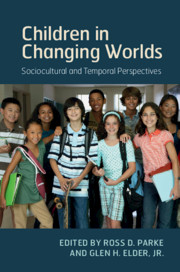Book contents
- Children in Changing Worlds
- Children in Changing Worlds
- Copyright page
- Contents
- List of Figures
- Contributor Biographies
- Preface
- Part I Theoretical and Methodological Approaches: A Cross-Disciplinary Challenge
- Part II Historical and Life Course Transitions: Economic and Demographic Change
- Part III Social, Legal, and Technological Change: Impact on Children
- Part IV Views of the Interdisciplinary Dialogue: From Developmental Science and Sociology
- Author Index
- Subject Index
- References
Part IV - Views of the Interdisciplinary Dialogue: From Developmental Science and Sociology
Published online by Cambridge University Press: 18 July 2019
- Children in Changing Worlds
- Children in Changing Worlds
- Copyright page
- Contents
- List of Figures
- Contributor Biographies
- Preface
- Part I Theoretical and Methodological Approaches: A Cross-Disciplinary Challenge
- Part II Historical and Life Course Transitions: Economic and Demographic Change
- Part III Social, Legal, and Technological Change: Impact on Children
- Part IV Views of the Interdisciplinary Dialogue: From Developmental Science and Sociology
- Author Index
- Subject Index
- References
Summary
Philosophers through the ages have stressed time as a critical variable in life, and developmentalists today pretend to a lifespan framework. Paradoxically, many construals of time are still neglected in developmental science. This chapter focuses on time and fleshes out three developmental perspectives on time: the chronosystem from the bioecological systems framework, transaction, and specificity.
Bioecological systems theory characterizes development as a joint function of process, person, context, and time. The principle of transaction in development asserts that characteristics of individuals shape their experiences, and reciprocally experiences shape the characteristics of individuals, through time. Finally, the specificity principle contends that understanding lifespan development depends critically on what is studied in whom, how, and when. Time fits integrally into each prevailing developmental perspective.
Keywords
- Type
- Chapter
- Information
- Children in Changing WorldsSociocultural and Temporal Perspectives, pp. 275 - 298Publisher: Cambridge University PressPrint publication year: 2019

